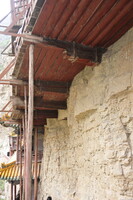| dc.coverage.spatial | Site: Hunyuan, Shanxi, China | en_US |
| dc.coverage.temporal | begun 491 (creation); rebuilt 1368-1911 (alteration) | en_US |
| dc.creator | unknown (Chinese) | en_US |
| dc.date | 491 | en_US |
| dc.date.accessioned | 2013-09-24T17:52:19Z | |
| dc.date.available | 2013-09-24T17:52:19Z | |
| dc.date.issued | 491 | en_US |
| dc.identifier | 235352 | en_US |
| dc.identifier.other | archrefid: 2524 | en_US |
| dc.identifier.uri | http://hdl.handle.net/1721.3/143087 | |
| dc.description | Lower stone walkway on the north side; upper wooden walkway overhead; A temple and monastery built into the west cliff (crag of Jinlongkou) 75 m (246 ft) above the ground near Mount Heng (Hengshan), the North Mountain of the Five Sacred Mountains. Like the Buddhists, the Daoists also had a set of holy mountains (wuyue), each of which in its own way had a special place in the history of the religion: Mt Hua in Shanxi Province (west), Mt Song in Henan Province (center), Mt Tai in Shandong Province (east), Mt Heng in Hunan Province (south) and Mt Heng in Shanxi Province (north). Over 40 halls, cabinets and pavilions within an area of 152.5 square meters are connected to each other by corridors, bridges and boardwalks. The temple is notable not only for its location on a sheer precipice but also because it includes Buddhist, Taoist, and Confucian elements. The sculptures of Shakyamuni, Confucius and Laozi appear together; the complex has about 80 sculptures. The structure is kept in place with oak crossbeams fitted into holes chiseled into the cliffs, cantilevered from the bedrock in back, which is the main support. Most parts of the current structure date from the Ming (1368-1644) and Qing (1644-1911) dynasties; tradition holds that it was started in 491 under the Northern Wei. Source: Wikipedia; http://en.wikipedia.org/wiki/Main_Page (accessed 8/5/2012) | en_US |
| dc.format.medium | wood; polychrome glazed ceramic tile; stone; brick; paint | en_US |
| dc.rights | © Scott Gilchrist, Archivision, Inc. | en_US |
| dc.subject | animal | en_US |
| dc.subject | architecture | en_US |
| dc.subject | decorative arts | en_US |
| dc.subject | deities | en_US |
| dc.subject | Buddhism | en_US |
| dc.subject | Buddhist | en_US |
| dc.subject | Daoist | en_US |
| dc.subject | Daoism | en_US |
| dc.subject | Confucius | en_US |
| dc.subject | Confucianist | en_US |
| dc.subject | Laozi | en_US |
| dc.subject | Northern Wei | en_US |
| dc.subject | Ming | en_US |
| dc.subject | Qing | en_US |
| dc.title | Hanging Monastery | en_US |
| dc.title.alternative | Xuánkong Sì | en_US |
| dc.title.alternative | 悬空寺 | en_US |
| dc.title.alternative | Hanging Temple | en_US |
| dc.type | image | en_US |
| dc.rights.access | Licensed for educational and research use by the MIT community only | en_US |
| dc.identifier.vendorcode | 1A2-CH-D-HM-K5 | en_US |
| vra.culturalContext | Chinese | en_US |
| vra.technique | construction (assembling), fabrication attributes: ceramics, painting and painting techniques | en_US |
| vra.worktype | monastery | en_US |
| vra.worktype | historic site | en_US |
| vra.worktype | temple | en_US |
| dc.contributor.display | unknown (Chinese) | en_US |


